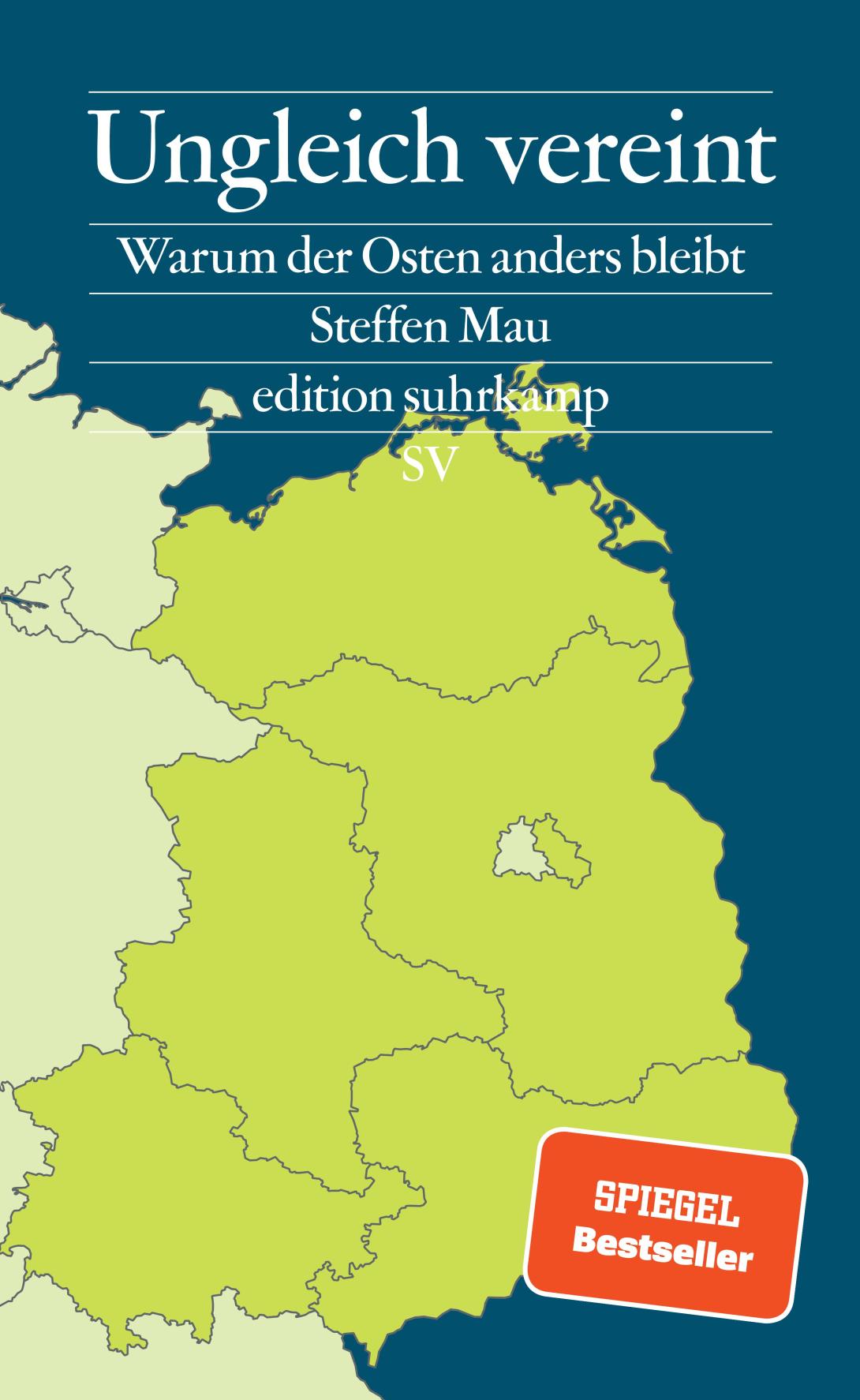Without fracture there can be no ossification

 Suhrkamp
SuhrkampSteffen Mau | Ungleich vereint | Suhrkamp | 168 pages | 18 EUR
On the evening that the results of the 2024 European elections were announced, I was stranded at the train station in Erfurt, the capital of Thuringia. My return journey from East to West was over before it had really begun. Nothing worked anymore, at least if you wanted to travel to southern Germany like I did. I had packed a weekend full of Ostalgia in my luggage: a 40-year high school reunion in Dessau, a trip down memory lane in my former hometown, and the Osten Festival in the wastelands of the former industrial town of Wolfen. And now, thanks to the decades of rail phobia suffered from by German transport ministers, I had the spontaneous opportunity to spend the night with old friends - who, like me, grew up in and were shaped by the GDR.
Everything was set for a sentimental evening in the backyard of the old vicarage; the beer was ready, old and new stories waiting to be told. Do you remember? What are you actually doing? Who did what back then? Then the regional results were announced: more than 30 percent for the right-wing populist AfD party in Thuringia, plus 15 percent for the left-wing populist alliance Sahra Wagenknecht - votes against the idea of an open and tolerant society. And less than three months later, a new state parliament was to be elected in Thuringia. The mood, my hosts told me, had long since changed. The tone was rough. Shouting, aggression and exclusion had taken over. It had become incredibly difficult to even talk to each other.
What is going on with my old homeland? Just in time for the East German state election year (Thuringia, Saxony, Saxony-Anhalt), Steffen Mau has published a slim volume that promises to answer this question. Since his bestseller Lütten Klein, published in 2019, he has been regarded as "a kind of domestic sociologist of the East Germans" (C. Pollmer). In his new book Ungleich vereint, he considers, in a pleasingly nondogmatic way, the theory that, despite all successful efforts to reconcile, lasting differences will persist between East and West. 35 years after the fall of the Wall, a phantom border still runs through the country. If you project different indicators such as rate of property ownership, club density, proportion of people with an immigration background, patent applications, inheritance tax revenue, number of tennis courts, average life expectancy, trust in institutions, etc. onto a map of Germany, the historical contours of the GDR and FRG inevitably become visible, he observes.
East German biographies are characterised by fractures, breaks in the life path. Mau now adds the original medical term "ossification" to this thesis, something on which he had already expanded in his Lütten-Klein book. This can mean ossification, but also bone formation, regeneration after a fracture, and scarring. As a mind game - as Mau understands it - the term is wide open to interpretation. Scar tissue itches, sometimes more, sometimes less. The fact that mainstream West German society has developed a very fine sensorium to its own sensitivities, but completely ignores the scars of the "other Germans" when looking at the "five new states", has also contributed to the emergence, according to Mau, of an "independent cultural and interpretative space of East Germany" - a partial East German identity.
The much-vaunted "reconstruction of the East" was largely one of the West. The basic assumption that the East would only have to catch up long enough to automatically become the West is reminiscent of the GDR's economic and social policy goal, drawn up by Walter Ulbricht in 1969: to overtake without catching up. However, perhaps the East is no longer lagging behind, but has actually long been a pioneer. In his book, Mau refers to developments in East Germany that have long since reached the West: lack of party loyalty, loss of trust in institutions, right-wing populist mobilisation.
So what should we do? In Erfurt's vicarage garden, we were asking ourselves this question by the third beer. Steffen Mau makes a few suggestions that certainly open up horizons for Germany as a whole. He imagines that East Germany could become a "laboratory of participation", following on from the brief period of renewal in the GDR between the fall of the Wall and German reunification. Where parties, institutions and civic initiatives no longer play a role, forms of direct democracy may help: citizens' councils, dialogues, round tables, and other forms of co-determination beyond parties and organisations. It is a return to the past, a revitalisation. Because in the heavy shadow cast by German reunification, most of the grassroots democratic initiatives that sprang up in the East between 1989 and 1990 quickly died out.



